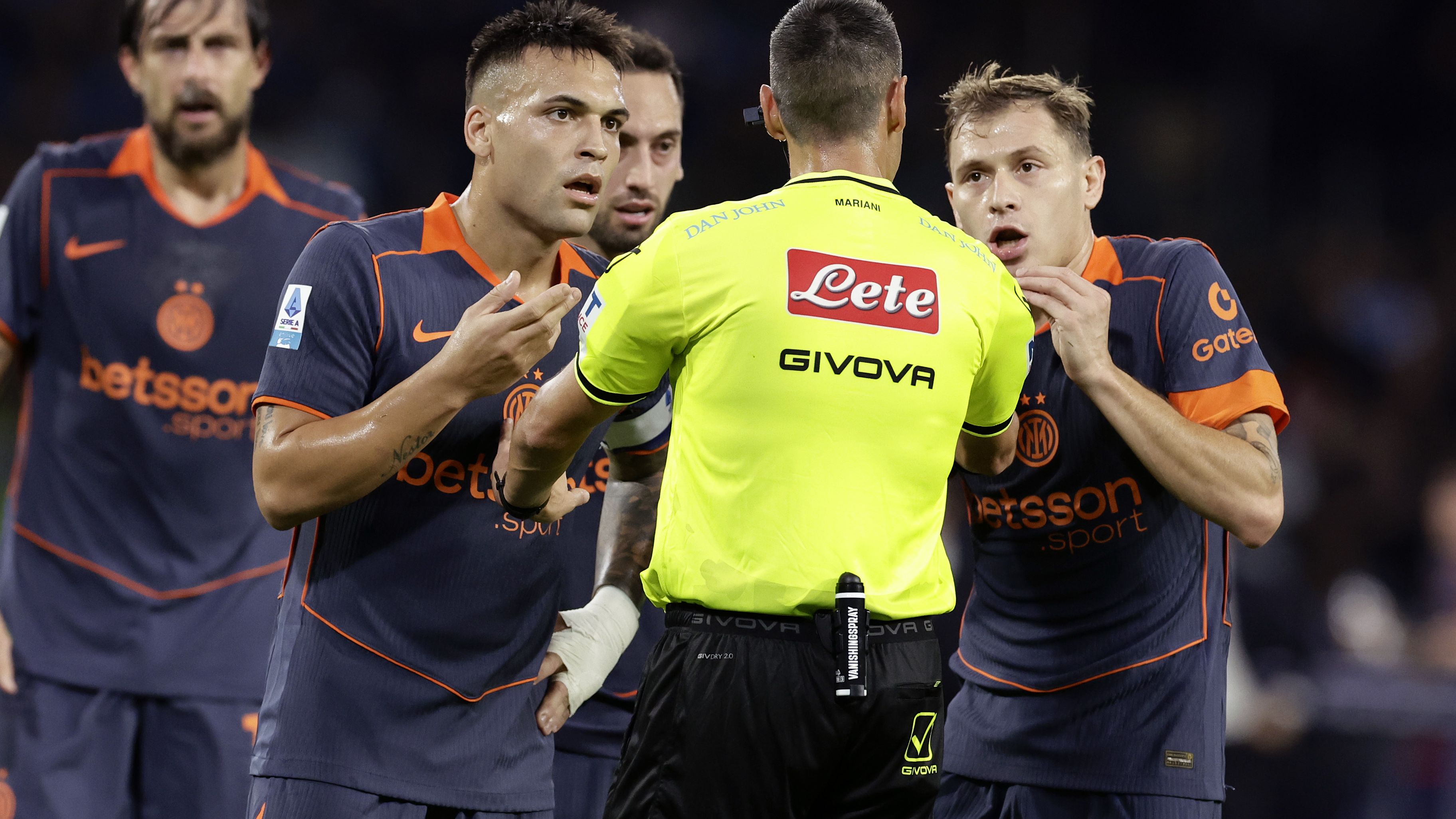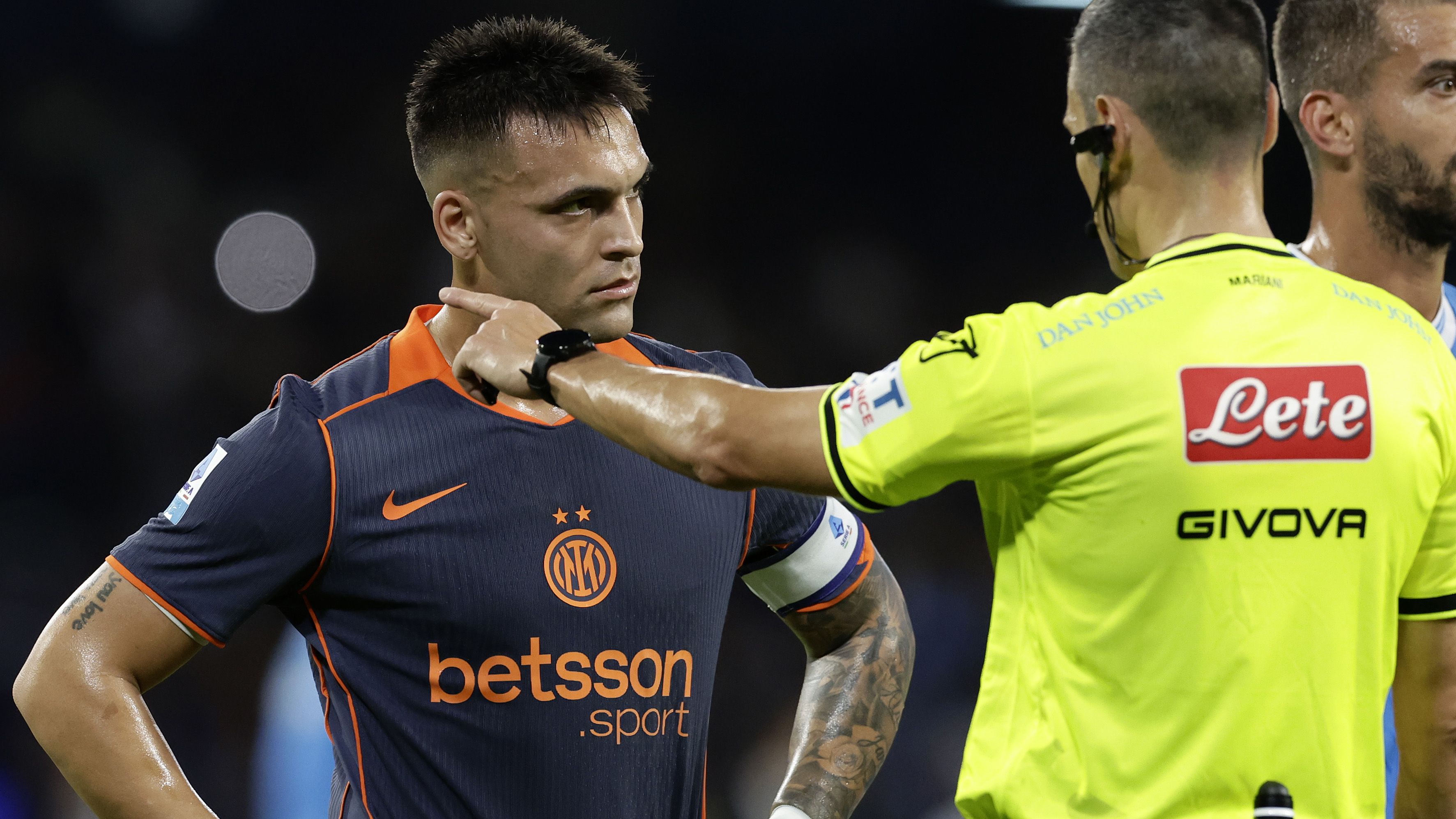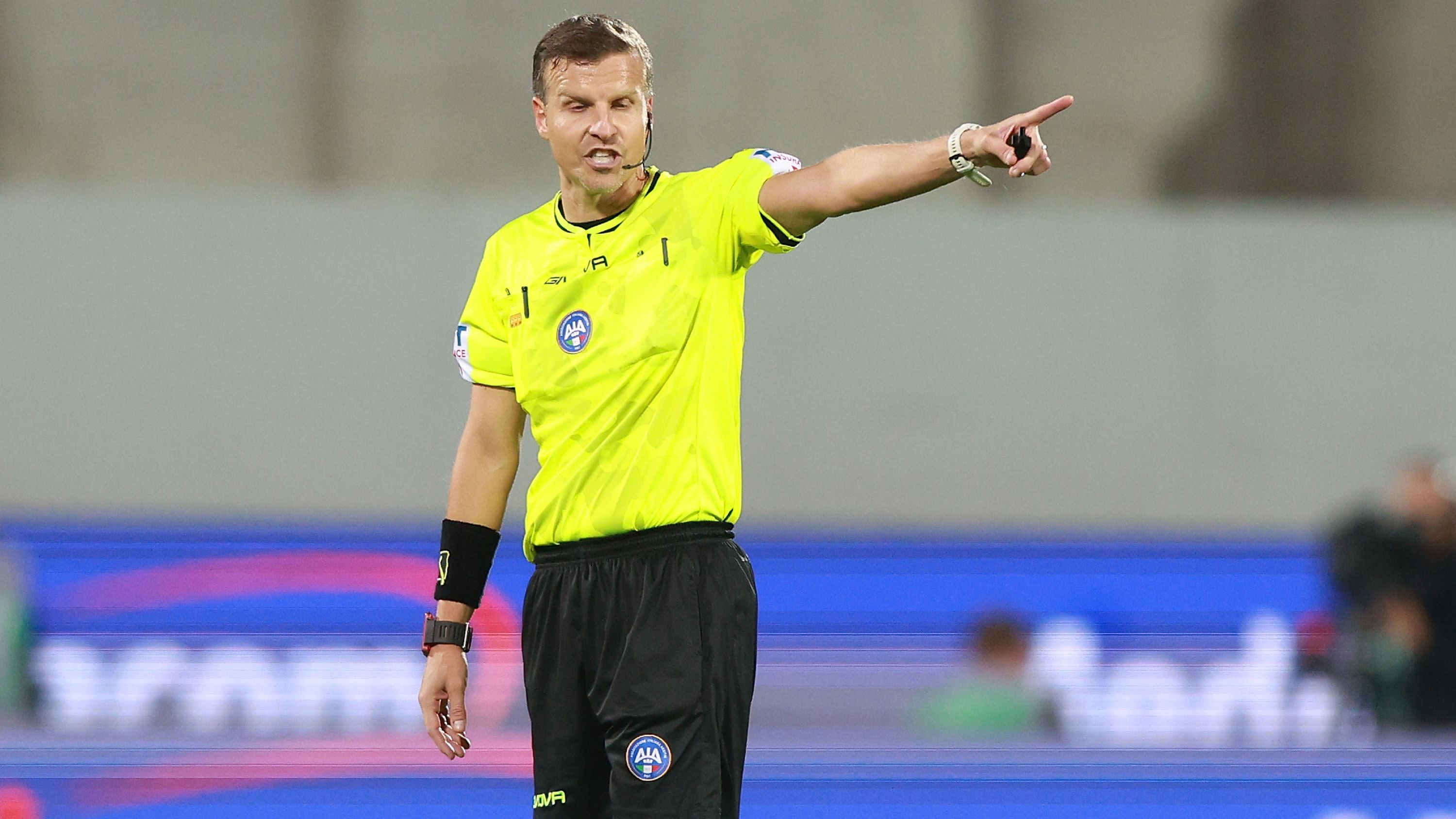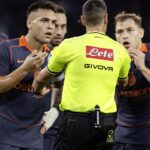


Unpacking the Fury Over Refereeing Blunders in Serie A
Refereeing errors in high-stakes matches like Napoli’s triumph over Inter have ignited widespread debate, highlighting the critical need for accuracy and accountability in Italian football. This incident underscores how minor misjudgments can alter game outcomes and erode trust in officials, pushing Serie A to confront and correct persistent issues in decision-making.
The Heated Napoli vs. Inter Showdown and Its Pivotal Moments
In the intense Serie A encounter between Napoli and Inter, a questionable penalty decision in the first half became the catalyst for uproar. The call stemmed from a slight touch by Henrikh Mkhitaryan on Giovanni Di Lorenzo, which referee Mariani hesitated on before being influenced by assistant Bindoni to grant the spot-kick just seconds later. Even though VAR operator Valerio Marini endorsed the ruling amid scant evidence of a foul, the conversion by Kevin De Bruyne propelled Napoli ahead. Tensions escalated when officials overlooked a handball involving Alessandro Buongiorno, culminating in a 3-1 victory for Napoli. Post-match discussions centered on these officiating lapses rather than the on-field action.
Immediate Repercussions for the Officials Involved
Italian refereeing authority Gianluca Rocchi swiftly imposed suspensions on the officials, arguing that their flawed judgments were unreasonable and detrimental to the sport’s integrity. He emphasized the importance of aligning decisions with established guidelines to safeguard the game’s overall quality and fairness.
Rocchi’s Strong Stance on Unjustifiable Errors
Following the controversy, Serie A’s referee overseer Gianluca Rocchi openly expressed his frustration, announcing the suspensions of Mariani, Bindoni, and Marini. In his remarks to Gazzetta dello Sport, Rocchi distinguished between typical errors and those that defy protocol, stating, “Errors vary in nature. We avoid suspensions when possible, but irrational ones that contradict our standards provoke my ire, as they prioritize personal ego over team and result integrity. That’s when action is necessary.”
Dissecting the Assistant Referee’s Role and Procedural Flaws
Rocchi was particularly dismayed by the assistant referee’s insistence on the penalty, viewing it as an unwarranted intrusion. He noted, “This situation is unusual and highlights a process flaw. While assistants are meant to evolve into more authoritative roles, their input should be limited to unambiguous issues within their scope, which wasn’t the case here. We anticipated an on-site review instead.”
Elaborating further, Rocchi clarified, “Mere contact doesn’t justify intervention; we reject the notion of non-interference. Here, the assistant bears major responsibility, followed by the head referee and VAR. Penalties must meet rigorous criteria, and this one fell short. The process was atypical-if Mariani had directly observed it, we’d have been more lenient.”
Consequences and Disciplinary Measures for the Trio
These missteps resulted in the officials losing their Serie A assignments, with reports depicting Rocchi as deeply upset over the grave mistakes that swayed the game’s result. Bindoni faced an immediate removal and potential reassignment to lower-tier matches, while Marini was shifted away from elite VAR positions.
Broader Examination of Refereeing Across the League
Beyond this fixture involving title contenders, Rocchi analyzed several disputed rulings league-wide, exposing various weaknesses in judgment. For instance, in the Lazio-Juventus matchup, he affirmed that Mario Gila’s challenge on Francisco Conceicao warranted a penalty but cautioned referees that incidental contacts, such as a player naturally stepping on another’s foot during play, shouldn’t be penalized as it’s part of the game’s flow.
Addressing Offside Controversies in Recent Games
Queries also arose about Rafael Leao’s disputed goal for AC Milan in their 2-2 stalemate with Pisa, centered on offside interpretations. Rocchi responded, “It’s a tight call, but moving forward, we’ll prioritize offside proximity to the keeper, as it significantly affects play. Here, the player was positioned at the edge of the box, exerting influence, unlike other cases where distance lessens the impact-proximity heightens the offense.”
Looking Ahead: Suspensions and the Push for Better Accountability
Mariani, responsible for the initial error in the Napoli-Inter game, was barred from midweek duties but might resume soon. Bindoni’s penalty, however, extends potentially through late November, given his key part in the erroneous call. This enforcement sends a clear signal about the necessity for officials to uphold protocols and steer clear of decisions that undermine the sport’s standards.
Understanding the Referee Chief’s Defense in Napoli vs. Inter Match
Background of the Controversial Match
In the high-stakes world of Serie A football, Napoli’s hard-fought victory against Inter Milan brought not only excitement but also intense scrutiny over referee decisions. This match highlighted ongoing issues with referee accuracy, particularly in penalty calls that can sway game outcomes. Referee chief Roberto Rosetti stepped forward to address the backlash, emphasizing the need for accountability in officiating to maintain the integrity of the sport. Keywords like “referee errors in football” and “controversial penalty decisions” have dominated discussions, as fans and analysts debate how illogical errors can impact teams like Napoli and Inter.
The game saw Napoli clinch a dramatic win, but it was marred by referee calls that many viewed as questionable. For instance, a pivotal penalty awarded to Napoli late in the match drew widespread criticism for appearing based on minimal contact. This incident underscores the pressure on referees to make split-second decisions under the watchful eyes of millions, making topics like “referee suspension in Serie A” increasingly relevant in sports media.
Key Referee Errors and Their Impact
Refereeing in football isn’t just about blowing the whistle; it’s about ensuring fair play and logical decision-making. During Napoli’s victory, officials faced accusations of illogical errors, such as misjudging player positioning and failing to consult VAR (Video Assistant Referee) effectively. These mistakes can lead to heated debates about “penalty decision controversies” and the overall quality of officiating.
- Common Types of Errors Observed: Referees often err in interpreting rules, like handball incidents or offside calls, which can be exacerbated by the fast-paced nature of matches. In this case, Inter fans pointed to a non-call on a potential foul that could have changed the game’s momentum.
- VAR’s Role in Question: Despite advancements, VAR didn’t intervene as expected, raising questions about “illogical errors in refereeing.” Experts suggest that delays in review processes contributed to the controversy, potentially affecting the final score.
- Fan and Player Reactions: Post-match interviews revealed frustration from Inter’s squad, with players labeling the decisions as “unfair,” while Napoli supporters defended the calls as justified, highlighting the divided opinions in “Serie A referee disputes.”
These errors aren’t isolated; they’ve sparked broader conversations about training for officials to handle “controversial penalty decisions” more effectively.
The Suspension of Officials Explained
Following the match, the referee chief announced suspensions for the involved officials, a move aimed at upholding standards in professional football. This decision targeted referees who made what were deemed “illogical errors,” serving as a deterrent for future inconsistencies. Suspensions in football officiating often involve mandatory reviews and retraining, focusing on areas like rule interpretation and decision-making under pressure.
- Reasons Behind the Suspensions: Officials were suspended due to specific failures, such as overlooking clear fouls or misapplying penalty rules, which directly influenced the game’s outcome. This action aligns with Serie A’s commitment to “referee accountability in matches.”
- How Suspensions Work in Serie A: Typically, suspended referees undergo performance evaluations, including simulated match scenarios to address weaknesses. For example, one official might focus on improving “penalty decision accuracy” through targeted workshops.
- Broader Implications for the League: Such measures help maintain trust in the sport, preventing scenarios where “referee errors lead to match-fixing allegations,” although no evidence suggested foul play here.
By suspending officials, the referee chief sends a clear message about the importance of precision, especially in high-profile games like Napoli vs. Inter.
Referee Chief’s Defense and Future Reforms
Referee chief Rosetti defended the suspensions by arguing that they were necessary to combat “illogical errors in controversial decisions,” stressing that football’s evolution demands higher standards. In media briefings, he explained that errors aren’t just oversights but can erode fan trust, prompting calls for advanced training programs.
Key points from his defense included:
- Emphasizing Accountability: Rosetti noted that suspensions are part of a larger strategy to enhance “referee training for penalty decisions,” ensuring officials are better equipped with tools like real-time analytics.
- Balancing Criticism and Support: He acknowledged the human element in refereeing, stating, “We all make mistakes, but learning from them is key to improving ‘Serie A officiating standards’.”
- Potential Reforms Ahead: Discussions are underway for integrating AI-assisted reviews, which could minimize “controversial referee suspensions” by providing more objective decision support.
This defense highlights the ongoing evolution in football governance, where keywords like “referee chief statements” gain traction in search trends, reflecting public interest in transparent sports administration.
Lessons Learned from the Incident
Experts in sports analysis have broken down the Napoli-Inter match to identify patterns in “illogical referee errors.” For instance:
- Patterns in Penalty Decisions: Data from similar games shows that roughly 20% of penalties are later deemed controversial, often due to positioning errors by officials.
- Strategies for Improvement: Referees could benefit from pre-season camps focusing on “high-pressure decision-making,” incorporating VR simulations to mimic real-game scenarios.
- Impact on Team Performance: Studies suggest that disputed calls can affect player morale, with teams like Inter potentially facing long-term setbacks from such losses.
By addressing these issues head-on, the referee chief’s actions pave the way for a more reliable future in football, where “suspension of officials over errors” becomes a tool for positive change rather than just punishment.
In wrapping up the details, it’s clear that events like these fuel the conversation around “referee controversies in Serie A,” encouraging fans to stay engaged with the sport’s ongoing developments.









